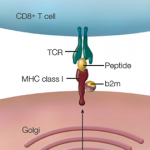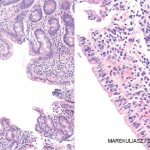Despite being compliant with a gluten-free diet, the woman kept regressing after periods of feeling better. Follow-up biopsies were unchanged.
Dr. Murray found that the woman had been traveling to a tropical country frequently to visit her sister, who was a missionary there. She was diagnosed with tropical sprue, which also causes malabsorption of food. It cleared up after she began taking the right medication.
“This illustrates that gliadin antibodies are not specific for the disease and that all that flattens is not celiac disease,” he said. “So even in that case, be careful.”
False Positives
Tropical sprue isn’t the only thing that can cause a false positive on a biopsy. Non-steroidal anti-inflammatory drugs, self-limited enteritis, combined variable immunoglobulin deficiency including that seen after Rituxan (rituximab) use, and autoimmune enteropathy all can bring about similar pathology.
He also cautioned that olmesartan use can bring about an enteropathy that mimics celiac disease, he said. So when patients present with symptoms, stopping the drug should be a consideration, Dr. Murray said, though he added that this association is rare and that physicians should not be hasty in stopping the drug.
Even though “gluten-free diet” is something that “trips right off the tongue,” Dr. Murray said it’s important to remember that patients need support to stay on the diet—and to be careful with non-food products, including cosmetics, that could contain gluten.
“It’s a lot harder to undertake,” he said, “than it is to tell people to do it.”
Thomas R. Collins is a freelance medical writer based in Florida.



